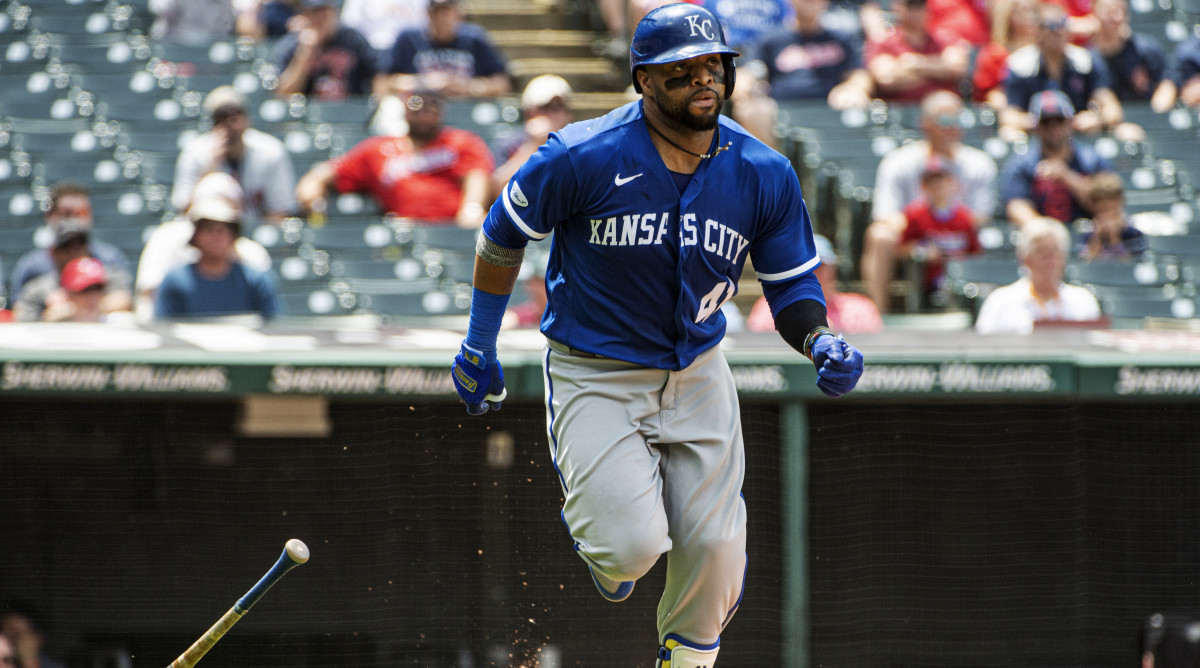The Mariners-Royals Trade of Carlos Santana Is a Fitting Start to Deadline Season
Welcome to The Opener, where every weekday morning during the regular season you’ll get a fresh, topical story to start your day from one of SI.com’s MLB writers.
The 2022 trade deadline is on Aug. 2, two days later than its typical July 31 date that had been the norm for decades. But don’t let the pushed back deadline fool you: this trade season is already underway.
To wit, there was Monday’s deal that sent first baseman Carlos Santana from the Royals to the Mariners in exchange for a pair of minor league arms Wyatt Mills and William Fleming. A blockbuster swap? Not exactly, but the timing (and participants) of the trade are notable, and could portend what to expect in the weeks to come.

First, let’s break down the trade at hand. Seattle general manager Jerry Dipoto is no stranger to wheeling and dealing, so it’s not surprising that he is looking to add to his club following an offseason in which he swung deals for former All-Stars Adam Frazier, Jesse Winker and Eugenio Suárez. But his decision to get a jump on the rest of the trade market now, five weeks before the deadline, indicates the level of urgency he and the rest of the Mariners likely feel.
Seattle’s sudden need for help at first base comes after Ty France landed on the injured list with a sprained elbow. The timetable for his return is unknown, and rather than trot out in-house options, Dipoto decided the time to act was now. Santana got off to an awful start this season but has picked things up considerably of late, posting a .298/.405/.468 slash line over his last 27 games, posting more walks (17) than strikeouts (14).
The Mariners were a surprise contender a year ago, and entered 2022 with real optimism that this would finally be the season that they’d snap their a 21-year playoff drought. The expanded postseason field only added to that feeling, and to this point, the Mariners have been among the league’s most disappointing clubs. Monday’s 9–2 loss to the Orioles dropped Seattle to 7.5 games out of the last wild card spot, and the team has the fourth-worst record in the American League. There are still 87 games left on the schedule, but given France’s uncertain future, there was real urgency for the front office to look outside the organization for reinforcements.
Watch MLB games online all season long with fuboTV: Start a 7-day trial today!
The broadening playoff field has a two-pronged effect: yes, one more team from each league will get to play into October, but that could mean several teams that previously might have considered themselves sellers in years past could now be aiming to make a push for this year. A quick look at the AL landscape shows basically three teams that already appear to be looking toward 2023: the A’s, Royals and Tigers, though the latter certainly came into the season with higher expectations and thus might not be as quick as the other two to start selling off players. That makes for a crowded field to bid against, and likely factored into Dipoto’s decision-making calculus to swoop in for Santana now.
While the Mariners have clearly stepped on the gas, there will be other AL teams with losing records who are forced to take stock and make a decision on which way to go in the weeks ahead. The White Sox are in a division without a runaway best team, and don’t have a manager that would seem to be at all interested in starting over. They came into the season with high expectations, too, after back-to-back playoff appearances and were thought by many to be the best club in the AL Central. Injuries to a number of key players in the first half indicate that they should improve as those guys return to the field. Despite on-field results in recent years suggesting otherwise, the Angels are perpetually in win-now mode with two of the game’s biggest stars on their roster and in their primes. And the Rangers didn’t spend half a billion dollars on their middle infield this offseason to punt on a playoff push after three months. By acting now, Seattle has gotten a quick leg up on the competition in an attempt to separate itself from the muddled, mediocre middle.
At present, eight of the 15 AL teams have postseason odds greater than 30% (per FanGraphs), a group that does not include the Angels (15.5%), Mariners (7.4%) and Rangers (5.9%). In the NL, that number is eight. All of these clubs should, conceivably, consider it worthwhile to try and maximize their chances at contending this season, which could set us up for a potentially unprecedented buyer’s market. Then again, there are bound to be a few clubs that decide the final wild card spot isn’t worth trading prospects for short-term veterans. This was the concern that some had when MLB expanded the playoffs: more wild cards would create less incentive to put the best team on the field, especially if the current, cheaper roster could be enough for a team to sneak into the postseason anyway. Some version of both of these two potential outcomes could be true.
Fringe contenders could be willing to trade for veterans who address short-term roster holes but don’t require teams to give up top prospects in exchange. Meaning, this trade season, we might not see too many blockbuster deals. Instead, we could see more of what happened Monday. Santana might not be the move that tips the scales in Seattle’s favor. He’s 36 years old and his best days are behind him, though he’s been producing well of late and is on an expiring contract. That said, he is the most noteworthy player to be traded so far this season, and this trade between the Mariners and Royals is likely a sign of the deals to come over the next month or so.
Dipoto and the Mariners might be quicker than most to fire up a trade, but they probably won’t be alone in dealing for players like Santana.
More MLB Coverage:
• Juan Soto’s Patience Is Being Tested Like Never Before
• The Rays Need Front Office Creativity Once Again
• Aaron Judge and the Yankees Find a Compromise
• MLB Can’t Replace the Mud Man So Easily
• Oneil Cruz Gives the Pirates Hope for a Brighter, More Fun Future
